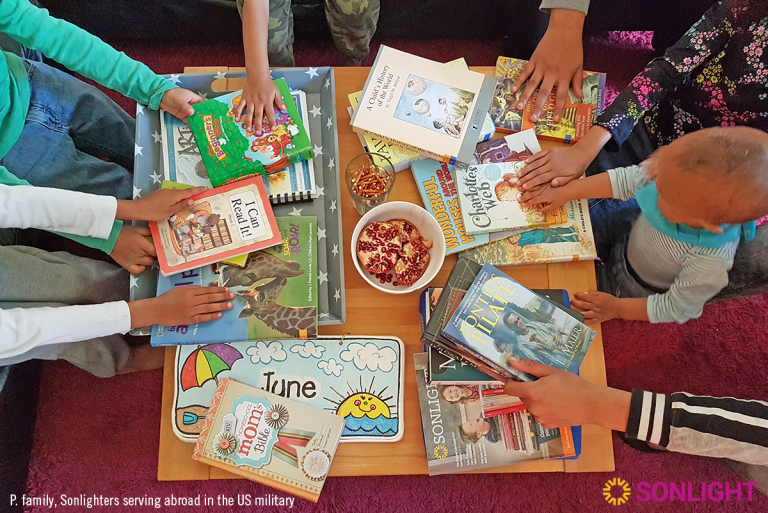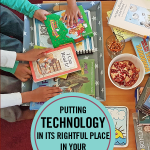
When my first child was born, we were given a baby play mat with toys hanging above it. Incorporated into the design was a clear, rectangular window, intended for positioning a smartphone directly in the child’s line of sight. This play mat was designed for infants too young to sit, crawl, or even roll over—and the toy makers decided to add a smartphone port? Is this wise?
Technology is advancing at lightning speed, and more and more jobs are requiring advanced computer skills. Videos, computer games, and portable smart devices create learning opportunities for the homeschool family.
These rapid changes lead us to ask: Is there any reason left for choosing a low-tech homeschool lifestyle when you could opt to homeschool entirely from a laptop computer?
Is there any benefit left to compiling bookshelves full of paperbacks and hardcovers when a single electronic device can store thousands of ebooks?
What role does technology have in your homeschool family culture? And are you happy with it?
Avoiding Technology Altogether
It is both unrealistic and unhelpful to attempt to do away with all technology in learning until your children have reached adulthood.
However, when children are in preschool to early elementary grades, there is good reason to hold off on introducing app-based learning activity, and to instead encourage old-fashioned learning through the great outdoors and physical learning resources like great books and puzzles.
Healthy Ways to Use Technology
What are some healthy ways to maximize the best that technology offers us as homeschoolers?
Educational technology has come a long way in the past couple decades, so the wise homeschooler can make use of apps and online subscriptions. These are some areas where educational technology might be most effectively used:
- When learning subjects that parents are not comfortable teaching (i.e. foreign language)
- For computer-based subjects (i.e. coding, typing, programming)
- If your child learns complex, abstract ideas best with the help of video demonstrations
- As supplemental practice or review
- For on-the-go learning in the car
If you are wary of relying too much on technology for your homeschool, I believe you are wise. We hardly need to worry that our children will have too little access to useful technology and too little understanding of how to use it. Instead it's reasonable to worry our children have
- too little exposure to the outdoors
- too little experience with real-world, face-to-face interactions
- too little persistence with difficult tasks they are accustomed to accomplishing with technology
When Technology is Taking Over
These are a few signs that technology has taken an unhealthy hold on our homeschool family culture:
- Are preschoolers unable to entertain themselves with simple toys or coloring books when required to wait? Instead they demand to watch videos or play digital games?
- Are sibling fights over shared tech devices a regular occurrence?
- Are children quick to complete computer-based school tasks but drag their feet with a hands-on, tech-free task?
- Is the family uncomfortable with silence, always needing to turn on a TV program or podcast for background noise?
- Are parents regularly using social media on their smartphone as a temporary mental break to escape from child-inspired chaos?
Setting Guidelines for Technology in Your Family
If these situations disrupt the peace of your homeschool routine, you may need to consider scaling back your use of technology in day-to-day family life. A family homeschool culture with a healthy screentime appetite might look like this:
- No one, parent or child, has developed a default habit of reaching for a device the minute their hands and minds are unoccupied.
- Time spent with devices is not the primary reward of completing chores or schoolwork.
- Tech devices are used as needed and not treated as the most desirable of all activities available.
- Video entertainment is largely enjoyed together as a family, rather than solo.
It is possible for you and your family to think critically about what you want your relationship with technology to look like and what sorts of legacies you want to leave in our fast-moving, digital age. It is worth taking the time to consider this question as a homeschooling family.








